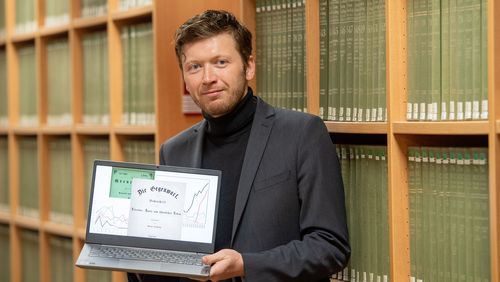Do young people find poems and novels more accessible and interesting if the texts are discussed on an emotional level? A team led by literature didactics professor Jörn Brüggemann is comparing two different approaches.
Discussions about literary texts are a key component of German lessons. But how teachers can best convey the complexities of these texts to students is a controversial subject among experts. A team of researchers led by Jörn Brüggemann, professor of literature didactics at the University of Oldenburg, will now explore this in greater depth in a study involving around 90 school classes. The project, entitled "The Importance of Subjectivity and Emotionality in Conversations about Literature in German Lessons" (SEGEL), will receive just under 300,000 euros in funding from the German Research Foundation (DFG) over a 24-month period. Volker Frederking, literature didactics professor at the University of Erlangen-Nuremberg, and education researchers Professor Benjamin Nagengast and Professor Ulrich Trautwein from the University of Tübingen are also involved in the management of this interdisciplinary project.
The project aims to investigate how different types of discussion influence the reception of texts – for example how well students understand a literary text, how they experience it aesthetically, and how relevant they consider it to be to them personally. "There is a common assumption in literature didactics that subjectivity and emotionality are particularly important for discussions about literature to be successful," Brüggemann explains, "but so far there has been little scientific research on this hypothesis." The team now plans to examine the influence of two factors, the "type of discussion" and the "form of interaction" in an empirical intervention study involving more than 2,000 school students.
What does a text mean to me?
The researchers distinguish between two types of discussion in literature lessons: the first type is limited to cognitive analysis aspects, for example detecting linguistic peculiarities and their functions. The second type encourages self-reflection. Here, the students examine for example the emotions that a literary text triggers in them. Regarding the second factor, the form of interaction, the team will investigate teacher-centred and student-centred forms of discussion.
In the coming school year, students from around ninety 9th and 10th grade classes at 26 secondary schools in Bavaria and Lower Saxony will take part in the experiment. Various poems and prose texts will be discussed, after which the researchers will assess the students' understanding of the texts with special tests. They will also analyze the impact on the students' aesthetic experience and their motivation using questionnaires that were developed, evaluated and optimized in previous third-party funded projects.
Increased empathy with literary characters
"By clearly separating the two factors 'type of discussion' and 'form of interaction,' we aim to conduct a first systematic assessment of the role of subjectivity and emotionality in discussions about literature," says Brüggemann. In a previous study, the team already found empirical evidence that the stimulation of subjective and emotional responses has a positive effect: students show more empathy with characters, perceive the text as more relevant to themselves, and find such discussions more stimulating than other types of discussion in German lessons.



